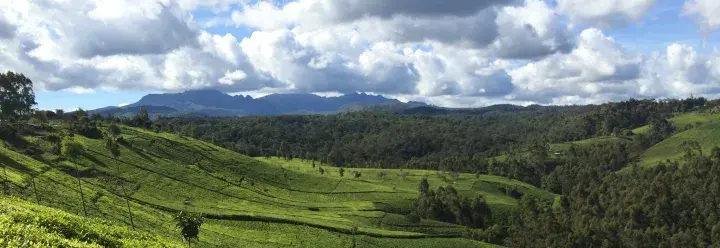Through our strategy, we’re aiming to increase our impact in tackling the biggest sustainability challenges of our time.
With less than 10 years until the deadline for achieving the UN Sustainable Development Goals (SDGs), action on the critical sustainability issues has never been more urgent.
We’re proud of the contribution ISEAL members have made towards reducing poverty and hunger, promoting equality and decent work, protecting biodiversity and the environment, and much more. But we know we can, and must, do more to help create change at the scale and pace required – and with growing commitment from governments and businesses to tackle these challenges, there’s a huge opportunity. Our new strategic framework sets out how we plan to achieve this over the coming years.
At ISEAL, we want to create a world where markets are a force for good – where production and consumption, resource management and trade benefit people and planet. Supporting and challenging sustainability systems remain at the core of what we do. Building on this, we’re expanding the reach of our Credibility Principles and guidance to cover emerging sustainability systems and including a focus on claims and communications. In addition, we’re convening high impact collaborations and catalysing innovation to increase the scale of our collective impact on pressing sustainability challenges.
We’ve identified five strategic priorities that will guide our work:
1. Inspiring solutions to sustainability challenges
ISEAL members see positive stories and signs of progress every day – yet global problems continue to mount. We’re in a climate emergency, and the natural world is in crisis with the ongoing destruction of ecosystems and biodiversity. Poverty stubbornly persists, inequality is rising and we’re seeing a roll-back of human rights in some countries in the wake of the pandemic.
These are the big issues we need to focus on – and we know that sustainability systems have an important role to play in the collective global efforts to tackle them. We’ll inspire and challenge our members to deepen their impact, bringing sustainability systems together with governments, companies and other partners to develop and test solutions – building on our learning from collective initiatives like the Global Living Wage Coalition and the Living Income Community of Practice, and from innovations being tested through the ISEAL Innovations Fund.
We’ve built up a wealth of knowledge, experience and tools – from research and evidence on sustainability impacts, to common core indicators to facilitate alignment and collaboration, to guidance on collecting and using data to improve system performance. For example, there’s huge potential in using geospatial data to tackle issues like deforestation at scale. We will use these foundations to identify and advance the most promising avenues through which sustainability systems can make a real difference.
2. Strengthening accuracy, reliability and resilience
Sustainability systems can only achieve their potential if people trust them. Sustainability systems of the future will not only be expected to accurately and reliably report on compliance but also on performance and sustainability outcomes achieved. We’ll build on the work we’ve been doing to improve performance monitoring and assurance – including strengthening remote auditing, which has become increasingly important during the pandemic, and testing the use of new sources of data to help detect risks of non-compliance and to monitor sustainability outcomes. This kind of innovation, collaboration and peer learning is needed now more than ever to ensure sustainability systems remain fit for purpose in a fast-changing world.
3. Broadening the applicability of ISEAL’s credibility tools
As the global ambition to tackle sustainability challenges grows, sustainability systems are evolving and we’re seeing new tools and approaches entering the marketplace. That’s something we welcome – but it’s essential that these new approaches use credible practices and make credible claims.
ISEAL’s background is in voluntary standards and certification, but we now bring our experience and expertise to a broader range of sustainability systems. Our Codes of Good Practice and other tools can support these systems to define what good practice looks like, develop mechanisms for monitoring, reporting and verification, and make meaningful, trustworthy claims about their sustainability impacts. For example, we’re developing good practice guidance to help emerging jurisdictional and landscape initiatives and the companies involved in them to demonstrate progress and make credible claims.
ISEAL’s updated Credibility Principles reflect current and future trends affecting sustainability systems – making them applicable for a wide range of schemes, such as data-driven and landscape approaches. Our Credibility Principles are central to guiding our future work.
4. Supporting effective use of credible systems
Many governments have pledged stronger action on sustainability and businesses have made commitments to deliver against the SDGs. There’s a big opportunity for us to support them to put their ambitions into practice.
We know that sustainability systems can help governments in areas such as sustainability regulation, trade and public procurement, and can help businesses to manage material risks and meet climate, zero-deforestation, human rights and other commitments. To support these efforts, we’ll provide governments and business influencers with the information they need to understand, identify and use schemes that embrace credible practices. We’ll also work with sustainability systems to identify how they can best work with governments to support achievement of shared sustainability goals.
5. Growing a dynamic ISEAL community
At ISEAL, our greatest strength is facilitating collaboration and learning as a community. We’ll continue to add value for existing members by offering high-quality services, tools and insights, while expanding our membership by bringing on board ambitious sustainability systems.
Growing our community to include new types of sustainability systems will make us more dynamic and unlock new opportunities for collaboration. A larger community will help build respect and broader recognition for the ISEAL brand: we want ISEAL Code Compliant to be a byword for trustworthy and effective sustainability systems. At the same time, we’ll continue to foster the culture of trust, openness and ambition within our community.
As we build on the strengths of ISEAL, we look forward to working with our members and their partners to deliver outcomes that are relevant and future-focused – and that support companies and governments in achieving their sustainability objectives and meeting the SDGs.
The big sustainability challenges that we face today demand a huge collective effort and a diversity of responses, combining tried-and-tested approaches with creative new ideas. Through this strategy, ISEAL is committed to be part of the collective effort to tackle the most pressing sustainability issues of our time.



